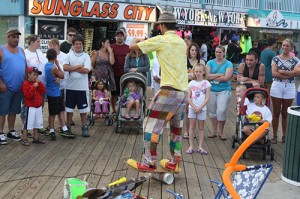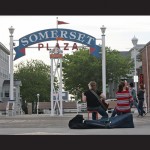
OCEAN CITY — Keeping the peace and finding a balance on the Boardwalk street performer issue are the challenges facing the Ocean City Police Department (OCPD) on the eve of another summer season in the resort.
After two successful challenges in federal court to the resort’s ordinance regarding street performers, the latest of which came down last fall, some of the teeth have been removed from the town’s somewhat stringent laws regarding the omnipresent street performers and buskers on the Boardwalk. However, on the eve of another Memorial Day weekend, the OCPD is intent on acknowledging the First Amendment rights of the buskers while looking out for the interests of the public and the Boardwalk merchants.
Last November, a federal judge ruled against the town of Ocean City in a civil suit that challenged the 30-foot noise ordinance for street performers on the Boardwalk. That ruling came on the heels of a 2011 federal court ruling that the town’s ordinance in part violated a spray paint artist’s First Amendment protections for freedom of speech and expression. As a result, the federal court ruling allowed street performers and artists to sell or collect money for certain expressive materials.
In the ruling, U.S. District Court Judge Ellen Hollander issued an opinion granting a permanent injunction essentially prohibiting the town from enforcing the 30-foot noise ordinance for street performers on the Boardwalk. The offseason ruling came at a time when Boardwalk busker issues were obviously not front and center, but with the dawn of a new season, the ruling and the previous ruling on spray paint artist Mark Chase’s similar suit are back in the forefront. OCPD Lieutenant Mark Pacini, Watch Commander on the Southern District Evening Shift, said this week the latest court ruling is creating challenges heading into the summer season.
“The court decided the 30-foot rule was not reasonable,” he said. “Now, we did our own tests with sound experts and found he was clearly in violation of the 50-foot rule, but the court saw it differently and that’s what we have to abide with.”
Emboldened by the various court rulings, some buskers will likely push the limits of the town’s watered down ordinance this summer and complaints from Boardwalk merchants, who often decry the fact the buskers are allowed to set up shop just a few feet away from where they have taxpaying businesses with expensive leases, will likely continue.
“The bottom line is, we’re trying to strike a balance up there and make sure the ordinance is enforced and the Boardwalk merchants concerns are addressed,” he said. “We have a nice working relationship with the buskers for the most part and we want everybody to peacefully coexist up there without infringing on the rights of the performers while at the same time looking out for the interests of the city, the merchants and, of course, the visitors.”
Pacini said the noise aspect of the ordinance was challenging for a lot of reasons, no matter if the rule is 30 feet, 50 feet or even 10 feet.
“The noise angle is tricky on the Boardwalk,” he said. “It’s tough up there because of all of the ambient sound. You have the rides and amusements, the sounds coming from the stores and the crowds.”
While the federal judge ruled in favor of the noise suit brought by violinist William Hassay, Jr., perhaps the biggest challenge for the OCPD was the earlier ruling on Chase’s case about what constituted expressive material and art in terms of the First Amendment.
“Mr. Hassay challenged the noise aspect of the ordinance, but Chase is the guy who really changed how we enforce things up on the Boardwalk,” said Pacini. “He challenged his First Amendment rights to free expression and that opened another can of worms. There are things that are protected under free speech and free expression and the list is long and rather murky. That’s our challenge.”
The list of acceptable freedom of expression items and art is long and somewhat vague. Pacini said the challenge is determining what is protected.
“Every day in the summer, there is somebody up there with a new scheme and a new plan to make some money,” he said. “It’s not always expressive or art. Some are just trying to make a buck and are testing the limits of the ordinance. We have to tread lightly with enforcement because it isn’t always black and white.”
Pacini said the most common complaints about the Boardwalk street performers are that they don’t pay taxes, they don’t have a business license, and they are accepting credit cards but they don’t document their sales or give receipts. In the case of spray-paint artist Chase, there have also been health issues raised with the fumes.
“The ironic thing is the OCPD doesn’t have jurisdiction on many of the complaints,” he said. “A lot of these things are business issues and tax issues and in the one case health issues.”
Pacini said the court rulings on busker issues tie the hands of the OCPD somewhat, but certain provisions in the town’s ordinance were held sacred. For example, the ordinance clearly holds out North Division Street as off limits because of the potential need for emergency vehicles to access the Boardwalk.
“The judge basically said this ordinance can’t be enforced but did leave us some leeway and allow us to place them where it is deemed most safe,” he said. “North Division Street was set aside as an off-limits site and nobody will be allowed to perform there. The thing is, if you restrict access, you have to have alternative areas. They are relegated to the street ends on either side of the Boardwalk and they have to be 10 feet from the tram lanes. That tram lane issue is tricky. If we really wanted to enforce that, we could really pinpoint exactly where they are allowed to set up.”
Pacini said the OCPD is cognizant of the concerns of the merchants and the public, while acknowledging the rights of the performers and artists. He said by and large the buskers are cooperative and want the situation to work for all involved.
“People call City Hall and ask can we do this and can we do that,” he said. “It almost always falls in my lap, but I work in close cooperation with [City Solicitor] Guy Ayres and we figure it out for the most part. Our enforcement posture is this: If we get a complaint, we review it and we allow them to continue until we can make a determination. We don’t shut them down and we don’t issue citations or even make arrests.”
